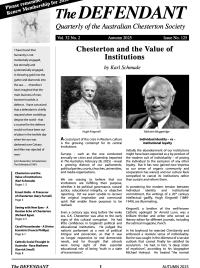
the 2019 Australian Chesterton
Conference at Campion College
Dr Garrick Small, an economist and university professor who is a frequent contributor to The Defendant, reviews a biography of Race Mathews, a well-known Labor Party figure with a strong interest in Catholic social thought and the principles of Distributism. Race was a long time and valued friend of the Australian Chesterton Society. He has only very recently died (on 5 May 2025) in Melbourne at the age of 90.
The biography, Race Mathews: A Life in Politics, by his wife, Iola Mathews, can be purchased from the publisher, Monash University Publishing.
Race Mathews will be remembered as one of the most eloquent apologists for Catholic social thought of the second half of the twentieth century.
This is all the more remarkable given his long association with Fabian Socialism, and with that part of the Australian Labor Party that remained after so many serious Catholics, particularly in Victoria, left or were expelled at the time of the Labor Split in 1955. While this could make Race an enigma, his wife’s recent biography of him goes some distance towards revealing a deeper consistency.
The natural virtues are those good habits that are available to man without the benefit of supernatural grace. They come through the application of reason, and the conscious personal resolution to reject the tyranny of the passions. Race Mathews was known for his dignified manner and intelligent commitment to fostering “a better life for ordinary people”.
His manner of achieving this was formed by his circumstances and education.
This biography begins with his foundations: “My mother shaped me with her love and my father with his passion for reason.”
Both had come from backgrounds of hard work. During his formative years he discovered socialism, which later displayed itself in his involvement in the Fabian Society and a career in the Australian Labor Party.
On leaving school, Race became a teacher. He was married at age twenty in 1956. By 1960 he was focused on moving into a career in politics. The pursuit of natural virtue was apparent in both aspects of his life.
His first forays into fulltime politics were marked by failure due to him not being attractive to the hard Left of his party. His marriage to Jill gave him three children before she died of cancer in 1970. In 1972 he married Iola and was devoted to her until his recent passing. He served in many capacities in the ALP, including ministerial positions at both federal and state levels.
There is a dignity in political leadership that is often lost in the Left/Right squabbling and utopianism of both. The scandals that attract media attention also obscure the dedication of the many who consider, like Plato, that politics is the highest pursuit, and despite their limitations dedicate themselves to using it to improve the lot of their fellows. These are probably the people who keep the government going, and Race Mathews was amongst them. While many might be critical of the wisdom of the Whitlam government that he served, his service was sincere.
His sincerity became apparent when he discovered Catholic social thought. Despite its association with the DLP and the Labor split that happened early in his political apprenticeship, Race recognised its power and devoted himself in later life to understanding it. The result was two doctorates and two books celebrating the achievements of distributist and co-operative initiatives, both in Australia and overseas.
Race followed this academic interest with papers that he delivered at several Australian Chesterton conferences (in 2004, 2008 and 2011) and with the promotion of distributist initiatives, including the Business Council of Cooperatives.
Despite his achieving a Doctor of Theology, Race’s continuing focus never wavered from the promotion of social justice through political action and education. Personal religion seems curiously absent from his entire biography. Perhaps that was due to the time and role Race found himself in. Likewise, his wife Iola reveals herself as strongly dyed with the feminism that was flourishing as she came to maturity and found herself arguing over amongst her parents’ circle of conservatives.
The book has many facets. It can be read as an in-house outline of the fortunes of the ALP from the time of the 1955 split to the present. It can be read as an adventure in discovery of effective applications of Catholic social thought by a non-Catholic willing to recognise the power of Catholic thought. It can even be read as a love story.
